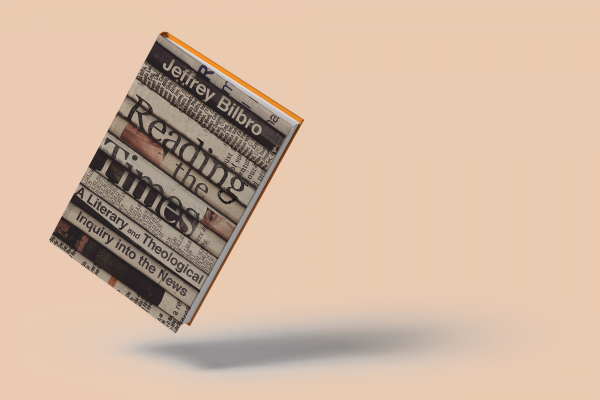UNTIL RECENTLY, I had a boss who kept CNN on all day in her office. I work in communications, so this made sense, but it made me wonder: How can we best consume the news? Does the news make us anxious and divide us? Or does it serve as a way to learn about the world and how we can better love and serve our neighbors? Though the evidence is mixed (we rarely have simple answers in life), Jeffrey Bilbro’s verdict on news consumption in Reading the Times is mostly negative.
Bilbro’s analysis suggests that modern media—understood broadly to include everything from newspapers to social media—divides our attention among trivia, binds us to the daily rather than allowing attention to the eternal, and diverts us from local, embodied concerns to national ones outside our scope of influence. His argument ranges broadly, integrating thinkers from Thoreau and Auerbach to the more modern Wendell Berry and Charles Taylor. The reader feels like they are in a college classroom, in a good way, with a professor who isn’t afraid to synthesize broadly to make their point.
While making sweeping claims, Bilbro doesn’t neglect the ethical question at the root of his work: How should we live? Each of his three sections exploring how the media can be destructive closes with constructive practices for how an individual can better balance their life. These notes follow James K.A. Smith, Justin Earley, and Tish Harrison Warren (among others) in their focus on praxis. Although these practices feel insubstantial when compared to the pulverizing forces facing them (how much can learning a craft, or walking your neighborhood, inoculate you against the power of social media?), they provide a useful counterbalance to his general pessimism and a guide for the concerned reader.
Reading the Times has limitations, stemming mostly from the scope of the project. As Bilbro points out, his mission is to provide wisdom for the individual rather than suggest structural reforms. My question, still, is: How can we ethically consume news under our current conditions? Perhaps structural reforms are necessary for any healthy engagement with media.
I am concerned that Bilbro’s moderate evangelical tradition leads him to make a few key missteps. Bilbro sees our modern public sphere as holding competing and parallel polarizations. This fundamentally misreads our time: Our U.S. right wing, from members of Congress to news media to churches, has become far more radical than its counterpart. A right-wing mob stormed the Capitol under the incitement of a right-wing president, after all. Similarly endemic to Bilbro’s tradition, I worry that some of the practices Bilbro suggests could guide us toward quietism in spite of his best intentions. Loving our neighbors amid a media maelstrom should include having difficult conversations across difference, rather than simply praying the Daily Office. In the middle of massive residential and occupational segregation, does our attention to embodied communities, as Bilbro recommends, simply further enforce racial and class division?
Reading the Times still does an excellent job probing the media landscape, how it changes us, and how we can, with God’s help, return to ourselves. The questions raised by my CNN-loving boss stay with me. What news am I listening to? And what is it doing to my heart? I’m glad for Bilbro’s wisdom.

Got something to say about what you're reading? We value your feedback!






